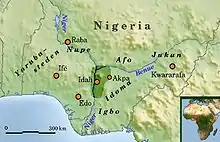Igala people
The Igala are an ethnic group of Nigeria. Their homeland, the former Igala Kingdom, is an approximately triangular area of about 14,000 km2 in the angle formed by the Benue and Niger rivers. The area was formerly the Igala Division of Kabba province, and is now part of Kogi State. The capital is Idah in Kogi state.
 Igala territory | |
| Total population | |
|---|---|
| 2,415,690-4,000,000(based on population projection and percentage) | |
| Regions with significant populations | |
| Languages | |
| Igala | |
| Religion | |
| Islam, Christianity | |
| Related ethnic groups | |
| Nupe, Yoruba, Ebira, Idoma, Esan, Igbo, Jukun |
History
The first "Ata", the title given to the ruler of the kingdom, was Ebule- Jonu, a woman; she was succeeded by her brother Agana- Poje, the father of Idoko. Idoko would later succeed him as Ata, and had two children Atiyele and Ayegba om'Idoko (Ayegba son of Idoko), Atiyele the first son of Idoko migrated eastward of the kingdom to establish Ankpa kingdom while Ayegba the second son of Idoko succeeded his father as Ata'Gala. He led a war against the Jukun, which resulted in victory. Idakwo Micheal was appointed as the new Ata in December 2012.[1]
The ata-ship of Igala rotated among four branches of the royal clan. Igala Kingdom was founded by Abutu- Eje in the 16th century. The kingdom was ruled by nine high officials called the Igala Mela who are custodians of the sacred Earth shrine.
The Igala mega state attained the height of its fame during the mid-17th century. The Idah-Benin war (1515-1516) was a war of mutual independence. The Igala state reached its political and commercial supremacy afterwards, when it became a leading exporter of choral beads, horses, medicine, skills and of course, slaves to the coastal region. Its growing economic power, nevertheless, changed the dynamics of the earlier complex relationships with several Idoma communities. The Igala people are found in villages and towns across the Nigerian state of Kogi. In each town or village where they are more than a thousand of Igala people, a chief (Oga Attah) which is a representative of the Attah Igala is crowned.
Culture
The Igala kingdom is ruled by an "Attah". Idakwo Micheal Ameh II became the twenty-seventh Attah following the death of his predecessor Attah Alhaji Aliyu Obaje in 2012.[1][2]
Notable Igala people
References
- Igala Kingdom Gets New Attah. Information Nigeria.
- Boston, J. (1967). "Igala Political Organisation" African Notes 4.2
Further reading
- Akinkugbe, O. O. (1976). "An Internal Classification of the Yoruboid Group". J.W.A.L. XI. 1–2, pp. 1–17
- (1978). A Comparative Phonology of Yoruba Dialects, Isekiri and Igala. Ph.D. Thesis, University of Ibadan
- Boston, J. (1967). "Igala Political Organisation" African Notes 4.2
- (1968). The Igala Kingdom. Ibadan: OUP
- Gordon, Raymond G., Jr. (ed.), 2005. Ethnologue: Languages of the World, Fifteenth edition. Dallas, Tex.: SIL International.
- Silverstein, R. (1973). Igala Historical Phonology. PhD thesis, university of California, Los Angeles
- Tokula, Lillian (2008). Re-Duplication in Igala: An Autosegmental Approach. Masters thesis, Department of Linguistics, University of Ibadan, Nigeria.